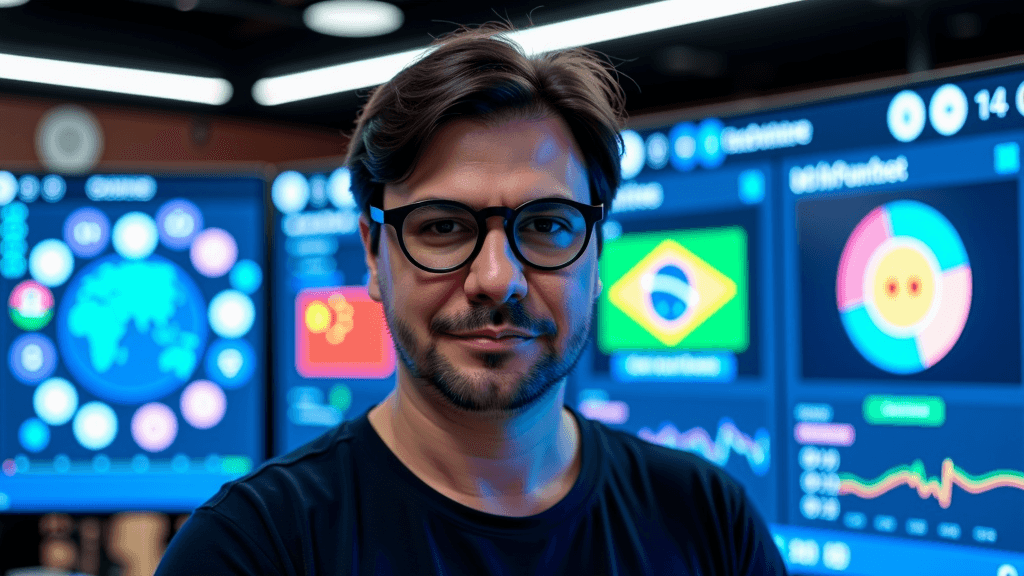AI Radar: Google Democratizes Access While Judiciary Faces Ethical Challenges — The Brazilian Panorama of the Last 24 Hours
May 24, 2025 | by Matos AI

The artificial intelligence landscape in Brazil continues to transform rapidly, with significant moves by both big tech and national institutions. Over the past 24 hours, we have seen a series of developments that reveal both opportunities and challenges in the implementation and regulation of these emerging technologies.
Google democratizes access to advanced AI for college students
In a strategic move that promises to accelerate young talents' familiarity with cutting-edge technologies, Google has announced the free availability of its Google AI Pro plan for university students. Offer includes 15 months of access to Gemini Pro, the company's most advanced AI model, plus 2TB of free storage for users who sign up by June 30.
Second information from VEJA, the initiative is available in Brazil, USA, United Kingdom, Japan and Indonesia, for users aged 18 or over who can prove a link with a higher education institution through academic email.
Join my WhatsApp groups! Daily updates with the most relevant news in the AI world and a vibrant community!
- AI for Business: focused on business and strategy.
- AI Builders: with a more technical and hands-on approach.
This is a smart move that goes beyond simple marketing. By putting advanced tools like Gemini 2.5, Veo 2 (video generation), DeepResearch and Gemini Live in the hands of students, Google is effectively building a new generation of professionals already familiar with its technologies — something I have been arguing is essential to closing the technology gap we face in Brazil.
The move is reminiscent of similar initiatives we've seen in the past with design and development software, which ended up creating loyal communities of users who later took these tools into the corporate environment. The strategy of “capturing” users during academic training has proven effective in establishing long-term technological dominance.
Meanwhile, Nvidia works to maintain dominance in the chip market
On the other side of the technology spectrum, Nvidia continues its journey to consolidate its leadership in the artificial intelligence chip market. According to Terra report, CEO Jensen Huang ended his participation in the Computex technology fair in Taiwan with a clear message: the company does not intend to lose its privileged position.
Nvidia is facing a delicate moment, with investors worried about potential declines in spending on AI infrastructure and the impact of trade restrictions imposed by the US, which have affected its share of the Chinese market. Added to this are signs that giants such as Microsoft and Google plan to reduce their investments in AI.
The announcement of NVLink Fusion, a technology that allows custom chips to be connected to Nvidia's AI infrastructure, demonstrates an intelligent platform strategy. By creating an ecosystem where other chips can integrate, the company seeks to maintain its core relevance even as its customers develop proprietary solutions.
This move by Nvidia demonstrates a sophisticated understanding of the AI infrastructure market, something we have also seen from other tech giants. In my consulting work with Brazilian companies, I have emphasized the importance of understanding these global dynamics to make local strategic decisions.
Flow: Google advances in the generation of hyper-realistic videos
Another highlight of the last few hours was the launch of Flow, a new Google tool that transforms text commands into hyper-realistic videos. According to InfoMoney, the technology, powered by the Veo 3 and Imagen 4 models, allows any user to describe a scene and receive a sequence with coherent characters and consistent scenarios in just a few seconds.
This tool represents a direct response to OpenAI's Sora, and signals the acceleration of the race for supremacy in the generation of audiovisual content via AI. The ability to create realistic videos from textual descriptions promises to revolutionize sectors such as marketing, entertainment and education, but it also raises serious questions about misinformation and deepfakes.
The democratization of these tools, initially available to subscribers of the Google AI Pro and Google AI Ultra plans in the US, points to a future where the production of high-quality audiovisual content will be within reach of anyone with access to these services.
The battle for control of information: Google accused of “stealing” content
In a worrying development for the media industry, the News/Media Alliance, the US newspaper publishers' association, has accused Google of "theft" over its new AI-powered search engine. According to UOL, the association's president, Danielle Coffey, said that Google “simply takes content by force and uses it without giving anything in return”.
The crux of the issue lies in the way Google’s new chatbot summarizes information from multiple websites to answer complex questions, but keeps links to the sources hidden in the results. This potentially reduces traffic to news sites, directly affecting their revenues.
This conflict exemplifies the fundamental dilemma I have been discussing for years: how to balance technological innovation with the sustainability of content creators. The internet's economic model has always depended on a delicate balance between platforms and producers, but generative AI threatens to definitively break this pact.
The case is particularly relevant in the Brazilian context, where media outlets already face significant financial challenges. The expectation is that, as in the US, Brazilian regulatory authorities will eventually need to intervene to establish clear rules on the use of copyrighted content in AI systems.
The Brazilian judiciary and the challenges of implementing AI
In the legal sphere, we have observed multiple developments that reveal both the potential and the risks of adopting AI in the Brazilian judicial system. According to analysis published by FOLHAMAX, the implementation of AI in the judiciary brings significant advances in efficiency and agility, but also raises ethical, technical and legal challenges.
Systems such as “Victor”, used by the STF, exemplify the practical potential of these technologies. However, the application of AI in judicial decisions raises fundamental questions about algorithmic transparency and the preservation of human discretion, essential to ensure fair and equitable decisions.
In parallel, Conjur highlights the urgent need for AI digital literacy for legal professionals. Since the emergence of generative AI in November 2022, lawyers and judges have often used these tools without proper training, leading to problems such as so-called “AI hallucinations” — when the system generates inaccurate or completely false information.
This point is particularly relevant considering the recent case in which the OAB/RJ submitted an urgent request to the STJ to suspend the activities of the “Resolve Juizado” platform, which uses AI to draft petitions. The OAB argues that the service represents an illegal practice of law and promotes mass judicialization.
In my mentoring sessions with legal startups, I always emphasize that technology should be an ally of the professional, not a substitute. The true value lies in the combination of human creativity and computational efficiency — something that only a properly trained professional can orchestrate.
Advances in AI regulation in Brazil
In the regulatory field, the week marked the installation of the Special Commission on Artificial Intelligence in the Chamber of Deputies. According to Nexo Jornal, the collegiate will debate the regulatory framework for AI in Brazil, based on the text authored by Senator Rodrigo Pacheco.
The bill in question seeks to establish standards for the development, implementation and responsible use of AI systems in the country. It is interesting to note that, while Brazil is slowly moving forward in this discussion, the European Union has already implemented the first global law for the use and development of AI in March 2024.
At the same time, we observed important movements at the state level. According to Migalhas, the governors of Goiás and Paraná recently sanctioned laws regulating the use of AI in their states. In Goiás, LC 205/25 establishes the State Policy for Promoting Innovation in Artificial Intelligence, while in Paraná, law 22.343/25 creates the AI guidelines plan in the state public administration.
This move towards decentralized regulation could create a complex scenario for companies operating in multiple states., but it also offers the opportunity for smaller-scale regulatory experimentation before implementing national standards — something we have seen work well in other countries with a federal system.
AI in education: between innovation and ethical dilemmas
The case of a Northeastern University business student who asked for a refund after discovering that her professor had used AI to create courseware raises fundamental questions about authenticity and transparency in education. According to a report by G1, the student felt that the use of technology had not been informed, contrary to the course program.
This case perfectly illustrates the dilemma that educational institutions face globally: how to integrate AI into pedagogical processes while maintaining students' trust and the perceived value of education? The line between legitimate use of technology as a support tool and the complete delegation of content creation to automated systems remains blurred.
In my experience leading innovative educational initiatives, I have observed that the most productive path is full transparency: making explicit which content is generated or assisted by AI, what the human curation criteria are, and how this integrates with pedagogical objectives. The problem is not in the use of technology itself, but in the lack of clear communication about its use.
Social dimensions of AI: from football to sexting
Beyond corporate, legal and educational aspects, the news of the last 24 hours also reveals how AI is infiltrating various aspects of social life. According to Lance, AI has become an essential tool in football, allowing coaches and teams to make more informed decisions through the collection of detailed data and analysis of game patterns.
On a more worrying dimension, the State of S. Paulo reports that teens are already having romantic and sexual conversations with AI chatbots. Experts warn that these interactions can lead to unrealistic expectations about sex and relationship dynamics, recommending that parents monitor the apps their children use and maintain an open dialogue about safe technology use.
These examples illustrate how AI is rapidly moving beyond the boundaries of corporate and professional environments to permeate intimate aspects of everyday life. — a phenomenon that I have been observing with particular attention in my studies on the social impact of emerging technologies.
Reflections and perspectives for the future
The panorama of the last 24 hours in the world of AI in Brazil reveals a scenario of accelerated transformation, with simultaneous movements on multiple fronts: democratization of access, technological advances, economic disputes, regulatory challenges and profound social impacts.
These developments reinforce my conviction that we are living in a historical inflection point, where decisions made today — by companies, governments, institutions and individuals — will have lasting consequences for the way society will organize itself in the coming decades.
For Brazilian organizations, the moment demands a proactive stance:
- Invest in digital literacy for employees at all levels
- Closely monitor regulatory developments, both national and state-level
- Develop clear policies on the ethical and transparent use of AI
- Seek strategic partnerships to accelerate the responsible adoption of these technologies
In my mentoring work with startups and corporate leaders, I have emphasized the importance of a balanced approach: neither technophobic resistance nor uncritical enthusiasm serves organizations well if they want to thrive in this new landscape.
The future belongs to those who can integrate AI capabilities with the fundamental human values of creativity, empathy, and critical thinking — keeping the human at the center of all technology decisions.
✨Did you like it? You can sign up to receive 10K Digital's newsletters in your email, curated by me, with the best content about AI and business.
➡️ Join the 10K Community here
RELATED POSTS
View all



